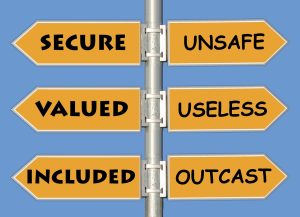Everyone feels insecure now and again. It could happen before a big event or a presentation at work, starting a new job, or entering a room full of strangers. We can feel insecure after we make a mistake. We might not feel assured in raising our children, interacting with our partners, or in our vocation.
For some of us, feeling insecure is how we feel most of the time. Insecure feelings may permeate much of our daily activities and relationships. At times, we might even feel like we never fit into any situation or like we have “imposter” stamped on our foreheads.
We see how everyone else does things better, faster, and smarter. We never believe that what we do, or who we are, is enough. We spend our days rebuking our decisions, questioning if we have done enough, and feeling like the least qualified person in every room. We might feel afraid to put ourselves out there in relationships because the amount of insecurity we experience inhibits us from taking risks or being vulnerable.
Feeling insecure and anxious
 Insecurity is something we can feel in big or small ways. It can be related to how we see ourselves, how we experience our relationships, and how we show up in the working or productive parts of our lives. It can force us to pull back from relationships, say no to opportunities we would love to accept, and live in regret. Feeling insecure makes us retreat further into ourselves, where we often don’t like what we find there either.
Insecurity is something we can feel in big or small ways. It can be related to how we see ourselves, how we experience our relationships, and how we show up in the working or productive parts of our lives. It can force us to pull back from relationships, say no to opportunities we would love to accept, and live in regret. Feeling insecure makes us retreat further into ourselves, where we often don’t like what we find there either.
Constantly feeling insecure can lead to anxiety. We scan the horizon, cultivate the worst case in our heads, and wait for the other shoe to drop. When we feel insecure about who we are and our choices, we often feel anxious about what could happen next. This type of anxiety can range from troublesome to debilitating, depending on its intensity.
We question if these feelings will ever go away. Are we doomed to constantly second-guess ourselves and never feel a moment’s peace? While it can feel like this noose will be there forever, breaking free from this insecurity is possible.
Insecurity and childhood
Often, our feelings of insecurity come from something in our childhood. Maybe we didn’t have a stable home. Perhaps our parents were not supportive. If we never got the validation we needed, we were stuck trying to figure it out for ourselves. What if we always felt compared to a sibling, or if an authority figure told us we failed?
For many of us, it is hard to name the emotional needs not met in our family of origin. It’s important to realize that naming what did or did not happen for us is not the same as blaming our parents or primary caregivers.
Whatever the root, counseling can be a place where you and your therapist slow things down and explore the causes of your anxiety. In therapy, calming and coping skills can help our nervous systems feel safe enough to quit “sounding the alarm” so you feel better. Christian counseling can also help to do the deeper work, to uncover the root causes of insecurity and anxiety, thus producing lasting change in your life.
How to face feeling insecure
 Insecurity often feels like a gray cloud above our heads. Even if we put on a happy facade, and are engaged and present for those in our lives, we hear the rumble of self-doubt or not being enough. While counseling is a great tool, there are things we can do now to address this storm.
Insecurity often feels like a gray cloud above our heads. Even if we put on a happy facade, and are engaged and present for those in our lives, we hear the rumble of self-doubt or not being enough. While counseling is a great tool, there are things we can do now to address this storm.
Acknowledge what you are feeling. If you feel sad, scared about an outcome, or question if you did enough, it is better to say that than pretend it’s all okay. Practicing “sitting with” these feelings in prayerful meditation or with a trusted friend allows us to feel it and move through it.
We are never as critical or mean to someone we love as we are to ourselves. To bring some perspective, we need to adjust our way of thinking. Treating ourselves with kindness and compassion can be a practical step toward quieting the inward voice that is always accusing us and “turning up the volume” of feelings of insecurity.
Journaling can be a great place to process why you feel insecure about something. Be honest. Then act like you were talking to a dear friend and ask some questions.
Is this reality?
If your best friend said these things to you, how would you respond? Coming at the situation from that perspective, can you see things differently?
Am I presuming things?
In our insecurity, we often assign emotions to other people. We say people are hurt, mad, frustrated, or exacerbated with us. But what is our proof? We assume our boss is upset with us when really, he or she might not be. What if the gruff behavior is not about you?
When our insecurity is in control, we often miss visual or body cues that tell us how people were feeling. As you think about the situation that caused you to feel insecure, can you remember people’s faces or their tones? Unless the other person involved has said, “I am angry!” How might the situation shift if we take out how we assume others are reacting to us?
What is mine to own here?
When we are lost in a spiral of insecurity, we often take on everything that occurred. It is okay to feel bad or sad or regret something, but we need to remember that ultimately people are responsible for their actions. You are not responsible for how people choose to react.
Read that again: You are not responsible for how people choose to react. People do not make us feel emotions. We choose what emotions to which we give power. That is why two people can walk through the same experience with two different reactions.
 One of the best ways to defeat insecurity is to let go of what was never yours: the way other people react.
One of the best ways to defeat insecurity is to let go of what was never yours: the way other people react.
You are not responsible for how your husband, daughter, best friend, mother, co-worker, barista at the corner coffee shop, or customer reacted. You are responsible for yourself. The other person in the situation could have chosen a different response. The fact they chose to lay into you instead of giving you grace is not your fault. What is yours in the situation is your choices and your reactions.
If someone is trying to get you to feel responsible for their reaction (“well, you ruined X or Y!”), leave that bucket of nonsense at the door. They have free will and can choose not to let your reaction ruin their day. That is passive-aggressive manipulation, and you are done owning their choices. We are all responsible for our reactions and how we choose to let things affect us.
What can I control?
Feeling insecure often makes us feel powerless. We believe we can’t do anything because so and so is already mad at us, or we will only make it worse, or the decision is already made. But until things are over, we always have agency, which means there is something we can control. Looking at the situation and the emotions it created, what is yours to control?
As we discussed above, you are not responsible for other people’s reactions. That also means you cannot control them. You cannot dictate if someone will forgive you or how they will react. You can only control what you do.
After you have worked through the questions above and have more clarity on the situation, what is yours to control? You cannot control the outcome, but you can control if there needs to be an apology. If you said something wrong, admit to it. If you dropped the ball, acknowledge it.
As you work through the questions above, if you conclude that the other person was wrong, refuse to pick up their part. You cannot control how they react and if they choose to try and make you feel bad for things. You can refuse to take on their guilt. You can set boundaries. You can offer to help them plan better in the future or see if something equitable to both of you can be solved. Take responsibility for your part and then leave the rest behind.
Feeling insecure does not define us
 Often when we peel back the layers of our feeling insecure, it becomes a much more manageable monster. If these feelings are not related to just one area but are something you fight daily, it might be time to see a counselor.
Often when we peel back the layers of our feeling insecure, it becomes a much more manageable monster. If these feelings are not related to just one area but are something you fight daily, it might be time to see a counselor.
The above-mentioned suggestions might be helpful, or a different approach to addressing your insecurity might be a better fit. Our feelings often become clearer when we bring them to the light.
Speaking to a Christian counselor might be exactly what you need to gain some clarity and identify a way to bring about real, lasting change. I am here to help. Call today to schedule your initial risk-free session. You do not have to live with the noose of feeling insecure. Help is here for you.
“Road Signs”, Courtesy of johnhain, Pixabay.com, CC0 License; “Rusty Lock”, Courtesy of Bru-nO, Pixabay.com, CC0 License; “Victory”, Courtesy of Shahrokh, Pixabay.com, CC0 License; “Woman with Camera”, Courtesy of Becky Sherburn, Unsplash.com, CC0 License
-
Kate Motaung: Curator
Kate Motaung is the Senior Writer, Editor, and Content Manager for a multi-state company. She is the author of several books including Letters to Grief, 101 Prayers for Comfort in Difficult Times, and A Place to Land: A Story of Longing and Belonging...
DISCLAIMER: THIS ARTICLE DOES NOT PROVIDE MEDICAL ADVICE
Articles are intended for informational purposes only and do not constitute medical advice; the content is not intended to be a substitute for professional medical advice, diagnosis, or treatment. All opinions expressed by authors and quoted sources are their own and do not necessarily reflect the opinions of the editors, publishers or editorial boards of Stone Oak Christian Counseling. This website does not recommend or endorse any specific tests, physicians, products, procedures, opinions, or other information that may be mentioned on the Site. Reliance on any information provided by this website is solely at your own risk.






